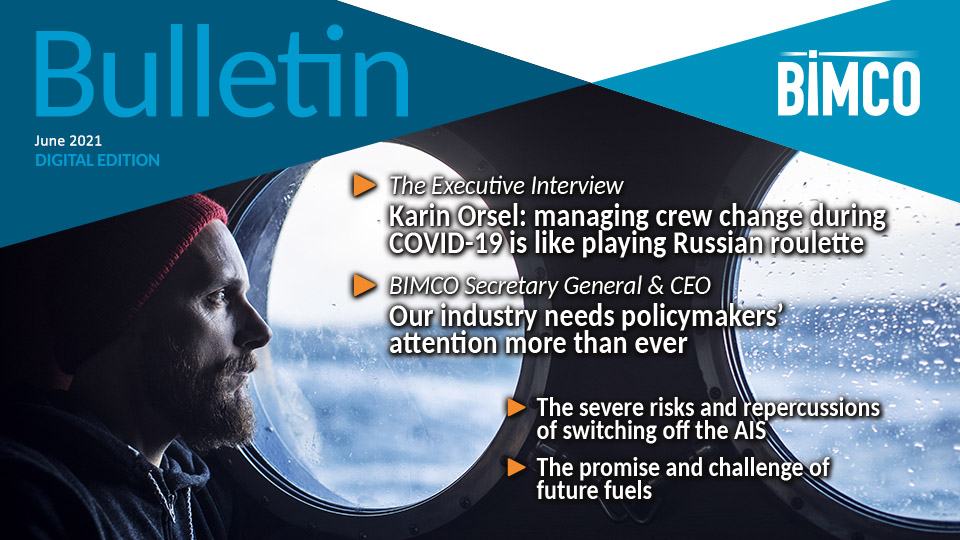BIMCO position statement 13: Plastic Litter
Overview
BIMCO's position has been approved by the BIMCO Board of Directors.
Background
The majority of plastic litter is originating from land-based sources, however reducing the amount of plastic litter in the oceans is a shared responsibility and requires a collective effort. By taking steps to reduce single-use plastics on ships, the shipping industry will contribute to addressing the global plastic litter problem.
Annex V of the MARPOL Convention, which entered into force on 31 December 1988, prohibits ships from discharging different forms of garbage, including plastic, into the sea, excluding discharges resulting from accidents and for securing the safety of ship. Nonetheless, accidental discharges may occur.
In accordance with the UN 2030 Sustainable Development Goal 14 (SDG 14), the IMO’s Marine Environment Protection Committee (MEPC) in 2018 adopted an action plan to address marine plastic litter from ships. Further, in 2021 the MEPC adopted the strategy which sets out the ambitions to reduce shipping's contribution to marine plastic litter and improve the effectiveness of port reception facilities and treatment. The strategy sets a vision to "strengthen the international framework and compliance with the relevant IMO instruments, endeavouring to achieve zero plastic waste discharges to sea from ships by 2025".
In 2019, BIMCO initiated a campaign to support the phasing out of plastic water bottles carried on board leading to a possible ban. BIMCO will collaborate with authorities on issuing guidelines to ships on how to reduce the use of single use plastic water bottles as well as other single use plastics.
In 2023, the IMO adopted a two-stage approach to address the environmental risk associated with the maritime transport of plastic pellets (also known as nurdles) in freight containers. Firstly, the development of a draft circular containing recommendations for the carriage of such pellets and subsequently, the development of amendments to appropriate mandatory instruments.
BIMCO’s position
- BIMCO supports the IMO’s initiative to reduce marine plastic litter from ships and will work to ensure that the entire process from handling plastic waste onboard a ship to its disposal ashore is managed in a sustainable manner.
- BIMCO supports phasing out single-use plastic water bottles, when replaced by sustainable alternatives or onboard systems that provide safe and good quality potable water, and the reduction of other unnecessary single use plastics.
- BIMCO supports finding possible ways in which to reduce or reuse plastics utilised for lashing and other work-related procedures.
- BIMCO supports the implementation of the IMO recommendation for the carriage of plastic pellets by sea in freight containers and the development of mandatory requirements such as the allocation of a UN number and resulting carriage in accordance with the provisions of the International Maritime Dangerous Goods (IMDG) code.
Feedback or a question about this information?
VPS Bunker Alerts
Veritas Petroleum Services (VPS) publish regular Bunker Alerts based entirely on fuel samples and have kindly permitted BIMCO’s Members to access this information.
The Bunker Alerts are not intended to be an evaluation of overall bunker quality in the port or area concerned, but usually highlight a specific parameter within the fuel which has raised a quality issue.
Want to stay up-to-date?
Register for updates about
{{Title}}
Receive emails when this topic is updated – you can choose how often.
Register NowELSEWHERE ON BIMCO
Chartering help & advice
This section contains a comprehensive source of information and guidance on chartering related matters. You will find invaluable information on many aspects of chartering distilled from our many years’ experience on advising members.
Learn about your cargo
For general guidance and information on cargo-related queries.
BIMCO Publications
Want to buy or download a BIMCO publication? Use the link to get access to the ballast water management guide, the ship master’s security manual and many other publications.




